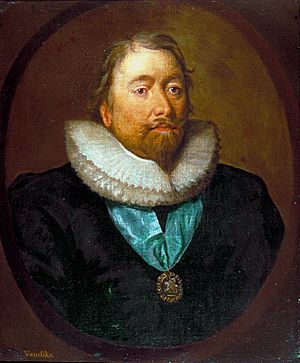Richard Weston, 1st Earl of Portland facts for kids
Quick facts for kids
The Earl of Portland
|
|
|---|---|
 |
|
| Lord High Treasurer | |
| In office 1628–1635 |
|
| Preceded by | James Ley, 1st Earl of Marlborough |
| Succeeded by | William Juxon |
| Chancellor of the Exchequer | |
| In office 1621–1628 |
|
| Monarch | James I Charles I |
| Preceded by | The Lord Brooke |
| Succeeded by | The Lord Barrett of Newburgh |
| First Lord of the Admiralty | |
| In office 1628–1635 |
|
| Monarch | Charles I |
| Preceded by | Office established |
| Succeeded by | Robert Bertie, 1st Earl of Lindsey |
| Personal details | |
| Born | 1 March 1577 Roxwell, Essex, England |
| Died | 13 March 1634/1635 (aged 56-58) |
Richard Weston, the 1st Earl of Portland, was an important English politician who lived from 1577 to 1635. He served as a top financial advisor to two kings, King James I and his son, King Charles I. He held powerful jobs like Chancellor of the Exchequer (in charge of the country's money) and Lord Treasurer (the chief financial officer). Richard Weston was especially important during King Charles I's "Personal Rule," a time when the King tried to govern without the help of Parliament. Weston helped the King find ways to manage the country's money without needing Parliament to approve new taxes.
Contents
Early Life and Career
Richard Weston was born in Roxwell, Essex, England, on March 1, 1577. His father was Sir Jerome Weston, who was a local official. Richard studied law at the Middle Temple, which was a place where future lawyers were trained.
Becoming a Member of Parliament
Weston became a Member of Parliament (MP) several times. This meant he was elected to represent different areas in the English Parliament. He served for places like Maldon, Midhurst, and Essex. In 1603, he was knighted, which is a special honor given by the King.
Working for the King
Richard Weston was a skilled diplomat and financial expert. He played a big role in managing England's money and foreign relationships.
Diplomatic Missions
During the reign of King James I of England, Weston was sent on important trips to other countries. He traveled to places like Bohemia, Brussels, and Spain. His job was to talk with leaders from these countries and try to solve problems. For example, in Spain, he worked to get back a region called the Palatine.
Chancellor of the Exchequer
When he returned to England in 1621, Weston was given a very important job: Chancellor of the Exchequer. He kept this job even after Charles I became king. In this role, he was responsible for managing the government's money. He was very good at this, but some people didn't like him. He was suspected of being a Roman Catholic, which was a problem in England at the time. He also upset the Queen, Henrietta Maria, by not giving money to her friends.
Dealing with Wars and Parliament
Weston did not want England to go to war with Spain in 1623 or France in 1626. However, when wars did happen, he was able to find ways to pay for them. He did this even when Parliament refused to help raise money through taxes.
Lord Treasurer and Personal Rule
In 1628, King Charles I made Richard Weston a noble, giving him the title of Baron Weston. Soon after, he became the Lord Treasurer of England. This was the most important financial job in the country. He was also given the Order of the Garter, a very high honor.
Managing the King's Money
Weston's money policies were not popular with everyone. In 1629, he almost faced a special trial by Parliament called impeachment. But King Charles I ended Parliament's meeting, which saved Weston. He then became a key advisor during the King's "Personal Rule." This was a time when King Charles I ruled without calling Parliament for many years. Weston found new ways to get money for the government without raising taxes through Parliament. He also made sure the King didn't spend too much.
Making Peace
Weston convinced King Charles I to make peace with France in 1629 and with Spain in 1630. Ending these wars saved a lot of money for the country. He also helped sign a secret agreement with Spain in 1634. By the time he died in 1635, the government's finances were in much better shape.
Family Life
Richard Weston was married twice. His first wife was Elizabeth Pincheon, and his second wife was Frances Waldegrave.
He had three children with his first wife:
- Lady Mary Weston
- Lady Elizabeth Weston
He had seven children with his second wife, including:
- Thomas, who later became the 4th Earl of Portland.
- Lady Anne Weston
When Richard Weston died, his son Jerome became the 2nd Earl of Portland.
 | Toni Morrison |
 | Barack Obama |
 | Martin Luther King Jr. |
 | Ralph Bunche |

